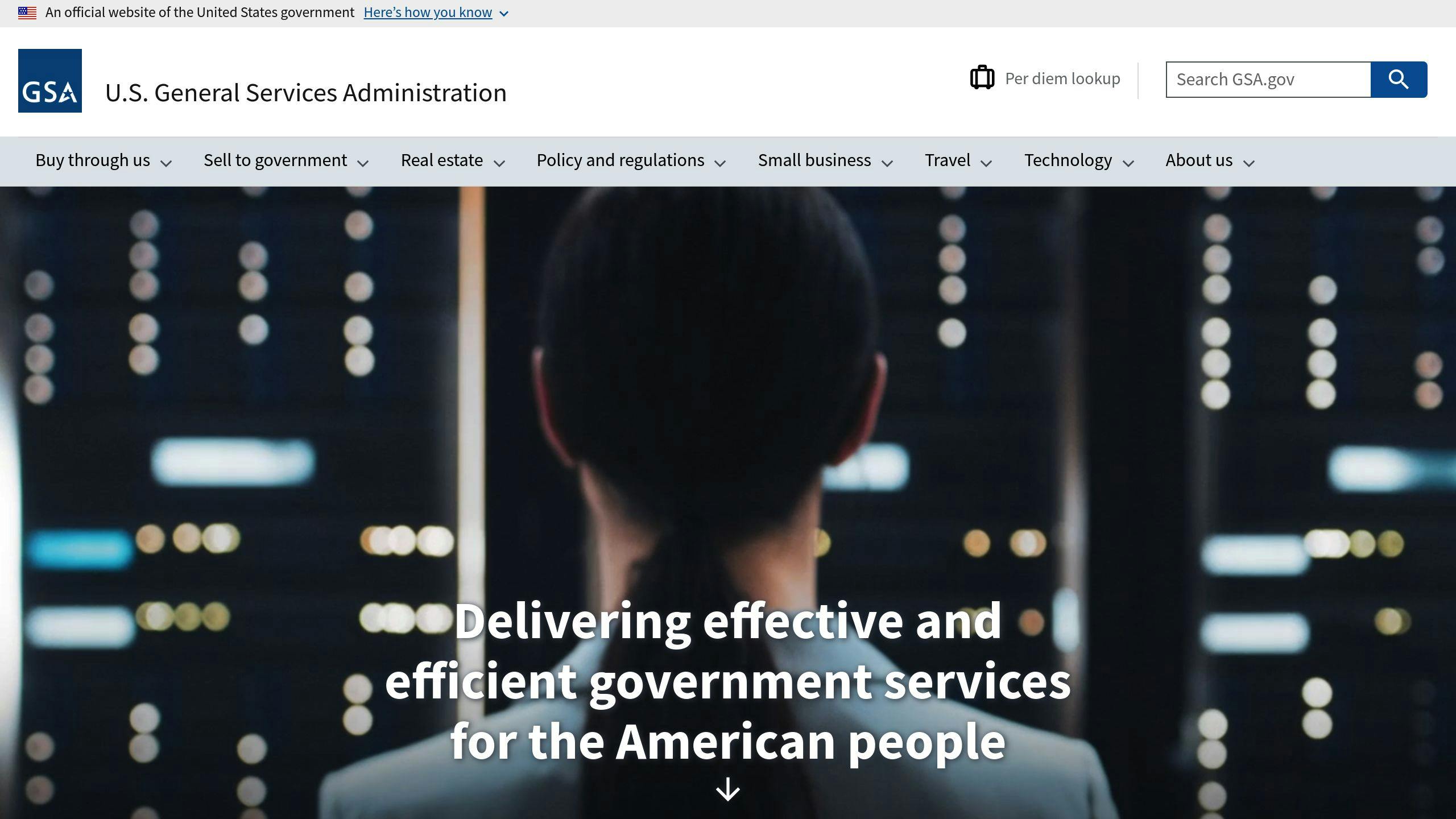Managing a GSA Schedule contract is essential for federal contracting success. Here’s what you need to know upfront:
- Stay Compliant: Meet GSA and FAR rules to avoid penalties.
- Key Metrics: Maintain $100,000 in sales within the first 5 years, increasing to $125,000 every 5 years after.
- Reporting: Submit accurate quarterly sales reports and Industrial Funding Fee (IFF) payments.
- Challenges: Small businesses often face issues with complex regulations, missed reports, and quality control. Use compliance tools and regular audits to address these.
- Tools & Teams: Build a team with defined roles (e.g., Contract Manager, COR) and use software for tracking, reporting, and performance monitoring.
Quick Tip: Set up a contract management system with automated tools for compliance tracking and reporting. This ensures smooth operations and avoids costly mistakes.
The article below dives deeper into compliance requirements, reporting standards, and strategies for effective communication with GSA Contracting Officers.
Managing Your MAS Contract Webinar
Understanding GSA Compliance Rules

Managing a GSA Schedule contract means adhering to specific rules and performance standards. To succeed, contractors need to fully understand these requirements and implement them effectively.
Key Metrics and Standards to Follow
GSA contractors must meet certain performance benchmarks to remain in good standing. For example, contractors must achieve minimum sales of $100,000 within the first 60 months. After that, the requirement increases to $125,000 for each additional five-year period [2].
Here are some key compliance areas:
| Requirement | Standard | Frequency |
|---|---|---|
| Sales Reports | Accurate and complete submissions | Quarterly |
| IFF Payments | Based on reported sales | Quarterly/Monthly (TDR) |
| E-Verify | Verify employee eligibility for U.S. work | Ongoing |
| Pricing Updates | Reflect current market rates | As needed |
| Quality Assurance | Use QASPs to maintain service standards | Continuous |
Contractors also need to regularly review and adjust their GSA Schedule prices to remain competitive and compliant.
How GSA Assesses Contractors
The GSA evaluates contractor performance through several methods:
- Contractor Assistance Visits (CAVs): These on-site reviews check for proper documentation, accurate pricing, quality assurance practices, and service delivery.
- Performance Monitoring: Contracting officers track performance using reports, labor documentation, quality assurance plans (QASPs), and customer feedback.
Contractors are required to submit detailed performance reports through www.sam.gov. These reports must include the total dollar amount invoiced and contractor direct labor hours [1].
Setting Up a Contract Management System
Having a solid contract management system is crucial for staying compliant with GSA Schedule requirements and meeting performance standards. This system helps you track obligations, fulfill reporting duties, and ensure your contracts run smoothly.
Building a Team for Contract Management
An effective contract management team starts with clearly defined roles and responsibilities. Each team member plays an important part in meeting GSA standards, from accurate reporting to overseeing quality.
| Role | Primary Responsibilities | Key Skills |
|---|---|---|
| Contract Manager | Oversees contract strategy and execution | Knowledge of GSA regulations |
| Contracting Officer’s Representative (COR) | Monitors performance and compliance | Technical expertise |
| Sales Reporter | Handles quarterly sales reports and IFF payments | Attention to financial detail |
| Quality Assurance Manager | Implements and monitors quality assurance plans | Process oversight |
Team members should receive specialized training on GSA requirements and stay updated on regulatory changes. Regular team meetings can help resolve challenges early and keep everyone aligned.
Using Tools to Manage Contracts
Modern tools are essential for tracking performance, ensuring compliance, and simplifying reporting. Here’s what your system should include:
1. Document Management Platform
A centralized storage system makes it easy to access documents during audits and reviews.
2. Performance Monitoring Software
Use tools to track deadlines, key metrics, and compliance requirements. These should integrate with:
- Sales reporting platforms
- Quality assurance tools
- Performance measurement systems
- Compliance calendars
3. Automated Reporting Systems
Automate reports for sales, IFF payments, labor hours, and pricing to save time and reduce errors.
Pro Tip: Set up your system to generate monthly internal performance reports. Focus on metrics like sales volume, customer satisfaction, and response times to GSA inquiries. This proactive approach can help you catch and fix issues before they show up in official reviews.
Make sure your system can handle changes in GSA requirements and business growth. Regular audits and updates will keep it running effectively and in compliance with evolving standards.
Once your management system is in place, the next step is focusing on accurate reporting and thorough documentation to maintain compliance.
sbb-itb-8737801
Meeting Reporting and Documentation Requirements
Accurate reporting and documentation are critical for staying compliant with GSA Schedule contracts. Below, we break down the key steps for submitting reports and keeping your contract information up to date.
How to Submit Sales Reports and IFF Payments
Sales reports and Industrial Funding Fee (IFF) payments are handled via the Federal Acquisition Service Sales Reporting Portal (FAS SRP). The IFF is set at 0.75% of your reported sales under GSA Schedule contracts.
Here’s the quarterly reporting schedule for most contractors:
| Reporting Period | Due Date | Requirements |
|---|---|---|
| January 1 – March 31 | April 30 | Sales report + IFF payment |
| April 1 – June 30 | July 30 | Sales report + IFF payment |
| July 1 – September 30 | October 30 | Sales report + IFF payment |
| October 1 – December 31 | January 30 | Sales report + IFF payment |
Key Reporting Rules:
- Submit quarterly sales reports within 30 days after the reporting period ends.
- Include SINs, contract/BPA numbers, and report sales in whole dollars (or $0 if no sales occurred during the period).
Performance Standards: GSA evaluates contractors based on the following metrics:
| Metric | Minimum Acceptable Level |
|---|---|
| Shipment/Backorder Status | Above 95% |
| On-time Performance | Above 75% |
| Cancellation Rate | Below 15% |
Keeping Pricing and Product Information Updated
Keeping your pricing and product information accurate is essential for compliance and staying competitive in the federal market. Updates can be made using the Schedule Input Program (SIP) or Electronic Data Interchange (EDI).
Price Update Guidelines:
- Submit price reduction modifications within 15 days of any price decrease.
- Include a detailed cover letter explaining the changes.
- Provide an updated Commercial Price List or Market Rate Sheet.
- Use the eMod system to submit modifications.
Documentation Tips:
- Invoices must include key identifiers like the GSA Contract Number, DUNS Number, SIN, and Part Number/Service Description.
- Clearly label open market items on invoices.
- Ensure catalogs are updated and approved in a timely manner.
Keep in mind that GSA catalog approvals typically take 2–3 weeks, so plan your updates accordingly.
Strong reporting and documentation set the stage for clear communication with GSA Contracting Officers, helping you address issues early and maintain solid performance.
Communicating with GSA Contracting Officers
Clear and consistent communication with GSA Contracting Officers (COs) is key to addressing compliance concerns and ensuring smooth contract performance. Professional and regular interactions can help resolve issues efficiently while meeting federal requirements.
Addressing Issues Early
Tackle contract concerns as soon as they arise to minimize compliance risks. Here’s how you can approach communication with COs effectively:
Keep Documentation Organized: Use official email channels for all correspondence. Maintain a chronological log of interactions and store records in one centralized system.
When reporting an issue, provide all necessary details upfront. For example, if there’s a pricing discrepancy, include:
- The specific contract clause involved
- A comparison of current and proposed pricing
- Relevant market research to support your case
- Potential solutions or recommendations
Set Clear Response Expectations:
| Communication Type | Expected Response Time |
|---|---|
| Urgent Issues | Within 24 hours |
| Routine Inquiries | 2-3 business days |
| Documentation Requests | 5 business days |
| Contract Modifications | 10-15 business days |
If an issue remains unresolved, follow up promptly based on its urgency.
Preparing for Performance Reviews
Performance reviews are a chance to showcase your commitment to meeting contract standards. Proper preparation is crucial, and these steps can help:
Gather Necessary Documentation: Collect all required reports, updated pricing, and performance data ahead of time.
Plan for Review Meetings:
- Go over your contract’s requirements and standards thoroughly.
- Organize evidence of performance metrics, including explanations for any missed targets and actions taken to address them.
- Create a concise summary highlighting key accomplishments.
Regular check-ins with your CO can strengthen your relationship and help ensure compliance. If you’re working with consultants, use their expertise to refine your communication approach and maintain a positive rapport with GSA representatives.
Good communication practices don’t just solve immediate problems – they also build a foundation for ongoing success.
Reviewing and Improving Contract Performance
Staying in touch with GSA representatives is important, but it’s just one piece of the puzzle. Regular performance reviews are equally important to ensure compliance and long-term success. A structured review process helps catch issues early and make improvements where needed.
Conducting Internal Performance Reviews
Set up a clear process to regularly evaluate how your contract is performing. Focus on important metrics and compliance requirements during these reviews.
| Review Area | Key Elements to Evaluate | Frequency | Required Documentation |
|---|---|---|---|
| Sales Performance | Sales volume, IFF payments, pricing trends | Quarterly | Sales reports, IFF records |
| Compliance Status | Regulatory requirements, reporting deadlines | Monthly | Compliance checklists, audits |
| Customer Feedback | Satisfaction ratings, performance reports | Semi-annually | Surveys, resolution logs |
| Contract Updates | Pricing accuracy, product/service listings | Quarterly | Modification records, price lists |
These reviews help ensure you’re compliant and ready for Contractor Assessment Visits (CAVs). Once you’ve got a review process in place, focus on fine-tuning your management strategies for steady performance.
Tips for Better Contract Management
Here are some practical ways to improve how you manage your contracts:
Simplify Your Compliance Program:
- Keep track of compliance requirements in an organized way.
- Train your team so they understand compliance rules.
- Regularly audit your program to make sure it’s working.
- Submit reports and IFF payments on time.
- Keep detailed records of all contract-related activities.
Take advantage of GSA tools to make contract management easier. For example, the GSA FAS Sales Reporting Portal simplifies reporting tasks [3]. You can also use resources like Interact, webinars, and training events to stay informed and improve your performance.
Conclusion
Handling a GSA Schedule contract requires precision, thoroughness, and adherence to GSA rules. Recent figures show that purchases made through the GSA Multiple Award Schedule (MAS) Program account for about 21% of federal procurement spending, amounting to roughly $42 billion annually. This highlights the immense opportunities for businesses that effectively manage their GSA contracts. For those navigating these challenges, seeking help from seasoned consultants can be a game-changer for achieving success.
Partnering with Experts Like GSA Focus

Managing the intricacies of a GSA contract can be daunting, which is why many businesses turn to expert consultants. GSA Focus offers specialized services to help small businesses tackle these challenges. From ensuring compliance and tracking performance to handling contract modifications, their team simplifies the process and helps businesses get the most out of their GSA contracts.
Effective GSA contract management opens the door to success in the federal marketplace. By applying the strategies discussed in this guide and collaborating with experts when needed, businesses can unlock new opportunities while staying compliant with their obligations.
Related Blog Posts
- How to Track GSA Contract Compliance
- How to Read GSA Solicitation Documents
- 5 Tips for GSA Advantage Sales Success
- How to Track Federal Sales with GSA Tools



